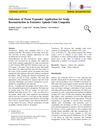Search
for
Sort by
Research
690-720 / 1000+ results
research Pilot Study of 15 Patients Receiving a New Treatment Regimen for Androgenic Alopecia: The Effects of Atopy on AGA
The new treatment regimen was effective in promoting significant hair growth in all 15 male patients with androgenic alopecia.

research An Open, Randomized, Comparative Study of Oral Finasteride and 5% Topical Minoxidil in Male Androgenetic Alopecia
Oral finasteride works better than topical minoxidil for hair growth, both are safe.

research Topical Solutions for Androgenetic Alopecia: Evaluating Efficacy and Safety
Topical treatments for hair loss can be effective but need careful safety evaluation.

research Pilosebaceous Physiology in Relation to Hirsutism and Acne
Male hormones are important for hair and oil gland development and can cause conditions like excessive hair growth and acne.

research The Childbearing Years: Hair Diseases
Different hair diseases affect people during childbearing years, with treatments ranging from medication to psychological support.
research Is There Any Association Between Clinical and Biochemical Hyperandrogenism in Women With Female Pattern Hair Loss?
Clinical signs of hyperandrogenism are related to female pattern hair loss severity, but biochemical markers are not.

research Hair Loss And Regeneration Performed On Animal Models
Animal models are crucial for learning about hair loss and finding treatments.

research Androgenetic Alopecia: Causes, Diagnosis, and Treatment Options
Hair loss from genetics and hormones can be treated with drugs or surgery.

research Androgenetic Alopecia in Men and Women
Androgenetic alopecia involves genetics, hormones, and can be treated with medications or surgery.

research Dutasteride Micro-Injections in Androgenetic Alopecia
Small injections of dutasteride improved hair thickness in men with hair loss without major side effects.

research Treatments for Androgenetic Alopecia and Alopecia Areata
Minoxidil and finasteride treat hair loss; more research needed for other options.

research Potential Targets in the Discovery of New Hair Growth Promoters for Androgenic Alopecia
The document concludes that targeting 5α-reductase, the androgen receptor, and hair growth genes, along with using compounds with anti-androgenic properties, could lead to more effective hair loss treatments.

research Recent Approaches of Antibody Therapeutics in Androgenetic Alopecia
Antibody treatments show promise for hair loss but need more research.

research Lifestyle Diseases and the Hair Growth Cycle: A Multidisciplinary Approach Using Nourkrin with Marilex, a Proteoglycan Replacement Therapy, for Anagen Induction and Maintenance
The study suggests that treating early hair loss with Nourkrin® with Marilex® can help prevent further hair loss and may be linked to reducing the risk of lifestyle diseases.

research Androgenetic Alopecia and Coronary Artery Disease in Women
Women under 55 with hair loss (AGA) may have a higher risk of heart disease (CAD).

research Quantitative Assessment of Female Pattern Hair Loss
Computer-aided imaging system helps measure balding area in female pattern hair loss.

research Topical Finasteride for the Treatment of Male Androgenetic Alopecia and Female Pattern Hair Loss: A Review of the Current Literature
Topical finasteride helps regrow hair and reduce hair loss in men and women.

research Disorders of Hair
The document concludes that hair analysis is not good for assessing nutrition but can detect long-term heavy metal exposure.

research Role of Genetics and Sex Steroid Hormones in Male Androgenetic Alopecia and Female Pattern Hair Loss: An Update
Genetics and hormones play a role in male and female hair loss, but more research is needed to fully understand it.

research Polymorphic CAG Repeat Numbers in the Androgen Receptor Gene of Female Pattern Hair Loss Patients
Longer CAG repeats in gene linked to more severe hair loss in females.

research Phytochemicals as Emerging Therapeutic Agents for Alopecia Treatment
Plant-based chemicals may help hair growth and prevent hair loss but need more research to compete with current treatments.

research Hair Density, Hair Diameter, and the Prevalence of Female Pattern Hair Loss
FPHL affects hair density and diameter, causing visible hair loss in older women.

research Hair Loss in Men and Women: Medical and Surgical Treatments for Androgenic Alopecia
The document concludes that ongoing medical therapy is crucial for preventing hair loss, and surgical options can restore hair, with future treatments for hair loss being promising.

research Comparative Efficacy of Minoxidil, Dermaroller, and PRP Treatments in Androgenetic Alopecia: A Clinical Study
PRP combined with minoxidil is the most effective treatment for hair growth in androgenetic alopecia.
research Repetitive Transcranial Magnetic Stimulation for Treatment of Trichotillomania: Case Series
rTMS may help treat trichotillomania in some patients.

research Outcomes of Tissue Expander Application for Scalp Reconstruction in Extensive Aplasia Cutis Congenita
Using tissue expanders for scalp reconstruction in patients with extensive Aplasia Cutis Congenita is effective and has minimal complications.

research The AR/miR-221/IGF-1 Pathway Mediates the Pathogenesis of Androgenetic Alopecia
A specific pathway involving AR, miR-221, and IGF-1 plays a key role in causing common hair loss.

research Clinical Features of Patients Treated With Hair Transplants in Female Pattern Hair Loss
Hair transplants are highly satisfactory for treating female-pattern hair loss.

research Global Photographic Assessment of Men Aged 18 to 60 Years with Male Pattern Hair Loss Receiving Finasteride 1 mg or Placebo
Finasteride significantly improves hair growth but may cause sexual side effects.